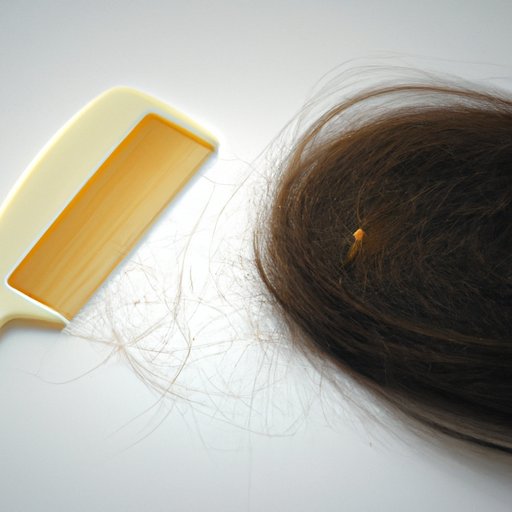Introduction
Hair loss is a problem that affects many people, both men and women. While it can be a natural part of aging, it can also be caused by a variety of other factors. Understanding the causes of hair loss and how to prevent it can help you maintain a healthy head of hair.

Identifying the Causes of Hair Loss: What You Need to Know
When it comes to understanding the causes of hair loss, there are several factors that can play a role. These include genetics, hormonal imbalances, medications, poor diet, stress, and environmental factors.
Genetics
Genetics can be a major factor in hair loss. If you have a family history of hair loss, you may be more likely to experience it yourself. Male-pattern baldness is a type of hair loss that is linked to genetics.
Hormonal Imbalances
Hormonal imbalances can also lead to hair loss. Hormones such as testosterone, estrogen, and thyroid hormones can all affect hair growth. Pregnancy, menopause, and certain medical conditions can also cause hormonal changes that can lead to hair loss.
Medications
Certain medications can also cause hair loss. Some medications used to treat high blood pressure, depression, and heart disease can lead to hair loss as a side effect. In addition, some chemotherapy drugs used to treat cancer can cause temporary or permanent hair loss.
Poor Diet
A poor diet can also contribute to hair loss. Eating too few calories or not getting enough of the essential vitamins and minerals needed for healthy hair can lead to thinning hair or hair loss. In addition, crash diets or fad diets can also cause hair loss.
Stress
Stress is another factor that can lead to hair loss. Physical, mental, and emotional stress can all contribute to hair loss. Hair loss due to stress is usually temporary, but it can take several months to regrow the lost hair.
Environmental Factors
Environmental factors such as pollution, UV radiation, and extreme temperatures can also affect hair health. Exposure to these elements can lead to dry, brittle hair that is more prone to breakage and hair loss.
Exploring the Benefits of Hair Care Practices to Prevent Hair Loss
Taking proper care of your hair can help prevent hair loss. Regular shampooing and conditioning can help keep your scalp and hair healthy. Avoiding heat damage from styling tools such as blow dryers, curling irons, and flat irons can also help reduce the risk of hair loss. Regular trims can help keep split ends from forming and causing further damage.

Understanding Nutrition and Its Impact on Hair Health
Proper nutrition plays an important role in maintaining healthy hair. Eating foods rich in essential vitamins and minerals like iron, zinc, and vitamin A can help promote healthy hair growth. Healthy fats such as omega-3 fatty acids can also help nourish the scalp and hair follicles. Protein is also important for healthy hair, so make sure to include lean sources of protein in your diet.

Examining Natural Treatments for Hair Loss
There are a variety of natural treatments that can be used to help with hair loss. Herbal supplements such as saw palmetto and green tea extract can help block the production of DHT, a hormone that can contribute to hair loss. Homeopathic remedies such as nettle root and horsetail extract can also help promote healthy hair growth. Essential oils such as lavender, rosemary, and cedarwood can also be used to stimulate circulation in the scalp and encourage hair growth.
Exploring the Role of Stress in Hair Loss
Stress can be a major factor in hair loss. Physical stress, such as surgery or illness, can lead to temporary hair loss. Mental and emotional stress can also lead to hair loss, as can chronic stress. Learning how to manage stress and practice relaxation techniques can help reduce the risk of hair loss.
Conclusion
Hair loss can be caused by a variety of factors, including genetics, hormonal imbalances, medications, poor diet, stress, and environmental factors. Taking proper care of your hair and eating a balanced diet can help prevent hair loss. There are also natural treatments that can help improve hair health. Finally, learning how to manage stress can also help reduce the risk of hair loss.
If you are struggling with hair loss, it is important to remember that you are not alone. Speak to your doctor or a trusted health professional to discuss treatment options and other ways to manage your hair loss.


